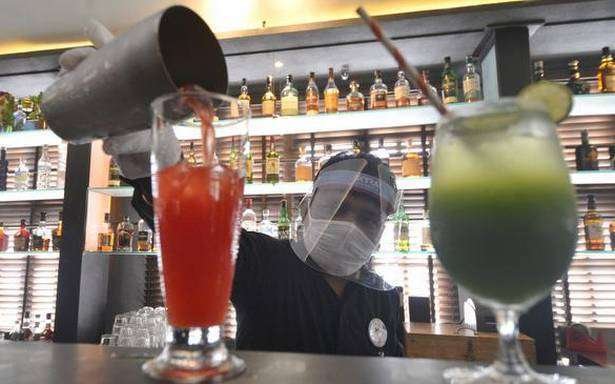[the_ad_group id=”1083″]
According to a Brandessence Market Research And Consulting report, the global demand for sports sponsorship market size, in terms of revenue, was worth $57.00 billion in 2020 and is expected to reach USD 89.60 billion in 2027, growing at a CAGR of 6.72% from 2021 to 2027. This is just a small indicator of the great magnum of the sports sponsorship industry and how brands, especially which want to appeal to the modern youth, are inclined towards their presence there.
However, the past few days have seen a strange scenario panning out after three players at the ongoing UEFA Euro 2020 snubbed sponsors like Coca-Cola and Heineken by pushing away their bottles from press conference tables. Do these acts have the potential to change how we see on-ground partnerships by brands panning out? exchange4media finds out.
A Timeline Of Events
Portugal star Cristiano Ronaldo started the trend by removing two Coca-Cola bottles from his press conference table before showing a water bottle to the cameras and making an appeal to people to drink water instead.
This was followed by French midfielder and Manchester United playmaker Paul Pogba who picked up Heineken non-alcoholic beer bottles and putting them under the table, reportedly because of his religious beliefs.
And just a few hours prior to the filing of this story, Italian player Manuel Locatelli repeated Ronaldo’s gesture by pushing away Coca-Cola’s bottles. Both the brands are among 12 top-tier sponsors for Euro 2020.
UEFA has now communicated to all the 24 teams participating in the tournament to stop removing strategically placed sponsor drinks from the news conference platforms.
UEFA director Martin Kallen said in a briefing, “It is important because the revenues of the sponsors are important for the tournament and for European football,” and players with religious objections “don’t need to have a bottle there.”
Who Wins Who Loses
Samsika Marketing Consultants MD Jagdeep Kapoor says, “You have to think who paid the (sponsorship) money and who got the limelight here. The answer is Coca-Cola or Heineken. Either by being on the table or by getting taken off it, the brands managed to get the chatter around them going on. I don’t think they have anything to lose here.
“Also, the sportspersons made a strong statement and their fans would have loved them for that. There may be no losers here, in that case, but possibly the organisers who might have to face the wrath of these sponsors if they take it upon themselves to discuss what was there in the contract.”
Brand-nomics MD Viren Razdan adds, “While there is an ideological win from this episode of a power statement being made about health and nutrition. I would be curious to see what the verdict would be of sponsors on such acts – as in the future they would be vulnerable to any form of backlash because of a superstar’s action. Today the sentiment is of support but tantrums in the future could have more severe ramifications on the commercial support of sports.”
What Should The Brands Be Doing
This is certainly not the first instance of sportspersons taking a stand against event sponsors in any way. Most recently, England all-rounder Moeen Ali had requested CSK during IPL 2021 to remove the logo of Chennai-based SNJ Distilleries from his match jersey, which was granted to the player.
Hashim Amla, Imran Tahir, and Adil Rashid are some of the other cricketers who have objected to having alcohol logos on their jerseys and kit. Amla and Tahir had also taken a fee cut in lieu of getting sponsor logos removed from their Portea jerseys.
So, is there a need for brands to take a fresh approach to how they partner with sporting events and do their on-ground marketing?
Brand Guru and Harish Bijoor Consults Inc Founder Harish Bijoor says that brands will have to become more circumspect in the way they advertise their offerings and the spaces they choose to do the same along with the tone, tenor and decibel of their activities.
“I think brands need to have their fingers on the pulse of their customers and indeed the sporting and cinematic icons of the day. It is important to read the pulse of the consumer before the pulse has been read and represented by the sports or cine star, as in these cases. A movement such as this gains traction only if there is acceptance of it at the consumer level. Ronaldo, Pogba and now Manuel Locatelli have read this right and have represented it in their own way. it has cascaded to become a movement with a life of its own. I call this the BrandSnub moment of our marketing lives. it seems to be here to stay.”
However, Razdan feels that it’s more on the players and organisers to understand the terms of association with any sponsor. He points out, “Sports in general — and football in particular — have been considered the greatest unifiers, along with the music. The more we allow such influences we would open the game to many more considerations cutting up the play. Keep the game clean, keep it pure. The AlcoBev brand being a major sponsor was no secret, the panel behind had glaring big logo’s, players had a choice — don’t play under that banner. Next, they might demand logos not to be displayed?”
He adds that the choice is up to the organisers what type of partnerships they want to have in the future. “Brands support sports because of its universal appeal which has cut across religion, caste and creed. It’s a choice sports bodies have to make and people. Many years ago, ICC used to have a tobacco major as the title sponsor till they took a call to ban tobacco from any form of association. ICC survived and moved on. If sports bodies have the courage they are free to rid themselves of such support.”
The above news was originally posted on www.exchange4media.com















